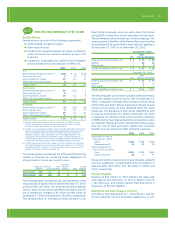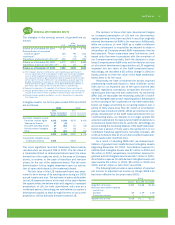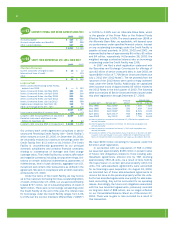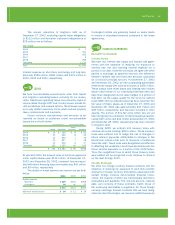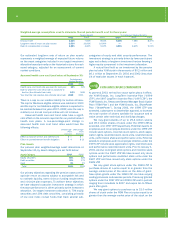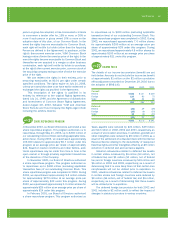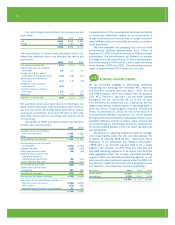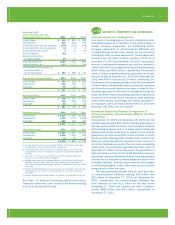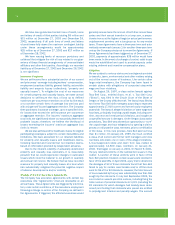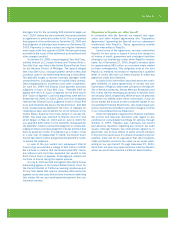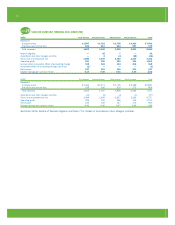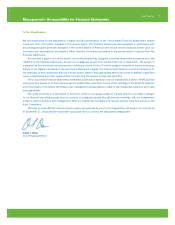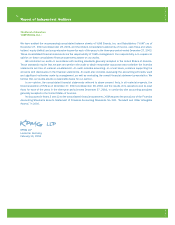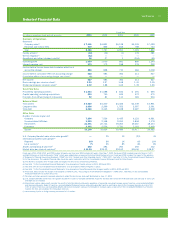Pizza Hut 2003 Annual Report Download - page 70
Download and view the complete annual report
Please find page 70 of the 2003 Pizza Hut annual report below. You can navigate through the pages in the report by either clicking on the pages listed below, or by using the keyword search tool below to find specific information within the annual report.
68.
In November 1997, we granted two awards of performance
restricted stock units of YUM’s Common Stock to our Chief
Executive Officer (“CEO”). The awards were made under
the 1997 LTIP and may be paid in Common Stock or cash
at the discretion of the Compensation Committee of the
Board of Directors. Payment of an award of $2.7 million
was contingent upon the CEO’s continued employment
through January 25, 2001 and our attainment of certain
pre-established earnings thresholds. In January 2001, our
CEO received a cash payment of $2.7 million following
the Compensation Committee’s certification of YUM’s
attainment of the pre-established earnings threshold.
Payment of an award of $3.6 million is contingent upon
his employment through January 25, 2006 and our attain-
ment of certain pre-established earnings thresholds. The
annual expense related to these awards included in earn-
ings was $0.4 million for 2003, $0.4 million for 2002 and
$0.5 million for 2001.
OTHER COMPENSATION AND BENEFIT PROGRAMS
note
19
We sponsor two deferred compensation benefit programs,
the Restaurant Deferred Compensation Plan and the
Executive Income Deferral Program (the “RDC Plan” and
the “EID Plan,” respectively) for eligible employees and
non-employee directors.
Effective October 1, 2001, participants can no longer
defer funds into the RDC Plan. Prior to that date, the RDC
Plan allowed participants to defer a portion of their annual
salary. The participant’s balances will remain in the RDC
Plan until their scheduled distribution dates. As defined
by the RDC Plan, we credit the amounts deferred with
earnings based on the investment options selected by the
participants. Investment options in the RDC Plan consist of
phantom shares of various mutual funds and YUM Common
Stock. We recognize compensation expense for the apprecia-
tion or depreciation, if any, attributable to all investments in
the RDC Plan, and prior to October 1, 2001, for any matching
contributions. Our obligations under the RDC program as of
the end of 2003 and 2002 were $11 million and $10 million,
respectively. We recognized annual compensation expense
of $3 million in 2003, less than $1 million in 2002 and
$3 million in 2001 for the RDC Plan.
The EID Plan allows participants to defer receipt of a
portion of their annual salary and all or a portion of their
incentive compensation. As defined by the EID Plan, we
credit the amounts deferred with earnings based on the
investment options selected by the participants. These
investment options are limited to cash and phantom shares
of our Common Stock. The EID Plan allows participants to
defer incentive compensation to purchase phantom shares
of our Common Stock at a 25% discount from the average
market price at the date of deferral (the “Discount Stock
Account”). Participants bear the risk of forfeiture of both
the discount and any amounts deferred to the Discount
Stock Account if they voluntarily separate from employ-
ment during the two year vesting period. We expense the
intrinsic value of the discount over the vesting period. As
investments in the phantom shares of our Common Stock
can only be settled in shares of our Common Stock, we do
not recognize compensation expense for the appreciation
or the depreciation, if any, of these investments. Deferrals
into the phantom shares of our Common Stock are credited
to the Common Stock Account.
Our cash obligations under the EID Plan as of the end of
2003 and 2002 were $25 million and $24 million, respec-
tively. We recognized compensation expense of $3 million
in 2003, $2 million in 2002 and $4 million in 2001 for the
EID Plan.
We sponsor a contributory plan to provide retirement
benefits under the provisions of Section 401(k) of the
Internal Revenue Code (the “401(k) Plan”) for eligible U.S.
salaried and hourly employees. During 2003, participants
were able to elect to contribute up to 25% of eligible
compensation on a pre-tax basis (the maximum participant
contribution increased from 15% to 25% effective January 1,
2003). Participants may allocate their contributions to one
or any combination of 10 investment options within the
401(k) Plan. Effective October 1, 2001, the 401(k) Plan
was amended such that the Company matches 100% of the
participant’s contribution up to 3% of eligible compensation
and 50% of the participant’s contribution on the next 2% of
eligible compensation. All matching contributions are made
to the YUM Common Stock Fund. Prior to this amendment,
we made a discretionary matching contribution equal to a
predetermined percentage of each participant’s contribu-
tion to the YUM Common Stock Fund. We determined our
percentage match at the beginning of each year based on
the immediate prior year performance of our Concepts. We
recognized as compensation expense our total matching
contribution of $10 million in 2003, $8 million in 2002 and
$5 million in 2001.
SHAREHOLDERS’ RIGHTS PLAN
note
20
In July 1998, our Board of Directors declared a dividend
distribution of one right for each share of Common Stock
outstanding as of August 3, 1998 (the “Record Date”). As
a result of the two-for-one stock split distributed on June
17, 2002, each holder of Common Stock is entitled to one
right for every two shares of Common Stock (one-half right
per share). Each right initially entitles the registered holder
to purchase a unit consisting of one one-thousandth of a
share (a “Unit”) of Series A Junior Participating Preferred
Stock, without par value, at a purchase price of $130 per
Unit, subject to adjustment. The rights, which do not have
voting rights, will become exercisable for our Common Stock
ten business days following a public announcement that a



